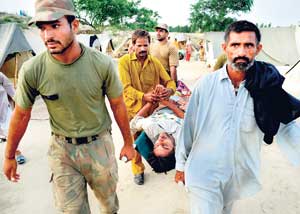ISLAMABAD: As eight million Pakistanis desperately await life-saving humanitarian aid amid devastating floods, the powerful military is reminding them of their own government's inability to tackle the disaster. It is a media campaign that risks undermining the country's shaky democracy.
The political damage to the government of the president, Asif Ali Zardari, is partly self-inflicted, most notably by his decision to leave Pakistan for a tour of France and Britain during the first week of the floods.
The visit to Britain, in particular, was already hugely controversial in Pakistan because David Cameron, the British prime minister, had urged Pakistan days earlier to "stop exporting terrorism". It was not so much what Mr Cameron had said that rankled, as where he said it: in India, Pakistan's regional nemesis. The Pakistani military was furious and leaned on Mr Zardari to cancel the British leg of his tour.
 |
| Pakistani soldiers carry a sick flood-affected villager to the hospital at an army relief camp in Sultan Colony in Muzaffargarh district of Punjab. AFP |
But Mr Zardari, a feisty politician who has overcome and survived a reputation for corruption and, subsequently, a decade behind bars, was in no mood to take orders from the military.
Yet the fact that he did not reverse his decision after the floods struck was an ill-judged act of defiance that has been seized upon by the military and sympathetic media. Mr Zardari's administration handed the military and its supporters a club with which to beat it - and the very idea of civilian government - over the head.
As the president was packing his bags for Paris, Gen Ashfaq Pervez Kayani, the army chief, embarked on a helicopter tour of flooded areas. The military's Inter Services Public Relations directorate (ISPR) hammered home the message - distributing video footage of the touring Gen Kayani that was clearly meant to portray the army chief as Pakistan's leader in a time of unprecedented crisis and, by comparison, Mr Zardari as a heartless opportunist.
According to Islamabad-based news executives, the image-making was carefully planned and promoted by the ISPR, a well-tuned unit of image and perception management specialists headed by Gen Athar Abbas, a man with close contacts in Pakistan's media.
Two of his brothers hold senior editorial management positions in popular cable news channels, Geo News and ARY News. Both stations regularly disparage Mr Zardari but rarely criticise the military.
The covert side of the military's media operations appears to be working overtime, too. It is run by a special wing of the Inter Services Intelligence (ISI) directorate.
ISI officers, speaking privately, like to boast about the spy agency's penetration of the Pakistani media, including a voucher-based system of bribe payments to journalists, television show hosts, editors and channel directors, and proprietors of media organisations.
Gen Kayani, the army chief, is no stranger to politics. On previous occasions, he has waded into political controversies in order to inveigh against the government.
In March 2009, he forced the government to reinstate Supreme Court judges dismissed by the previous military government, after thousands of protestors, led by Nawaz Sharif, the national opposition leader, launched a march from Lahore on Islamabad.
In October last year, the corps commanders conference of the army issued a public statement challenging the government's authority to accept "clauses impacting on national security" contained in a US law approving a five-year, US$7.5 billion (Dh28bn) package of civilian aid for Pakistan.
Certainly in the latest crisis, the military has not been simply sitting on the sidelines, carping at the government. The army has played a key role when the floods were at their most threatening, rescuing thousands of people and providing a lifeline to hundreds of thousands of others displaced or stranded by the floods.
It also has taken a stand against politicians interfering with flood management for selfish reasons.
It emerged last week that the army on August 11 had detained a federal minister, Syed Khurshid Shah, after he tried to stop the pre-emptive demolition of a dyke because it would flood his Sukkur constituency in southern Sindh province.
The troops intervened at the behest of Qaim Ali Shah, the provincial chief minister and a party colleague of the federal minister.
In another case, Ijaz Jakhrani, a federal minister, was accused of supervising the diversion of floodwater away from his Jacobabad constituency, and into an adjacent district of Balochistan.
Armed tribesman led by Mir Zafarullah Jamali, who had served as prime minister during the last military government, had blocked the first attempt to demolish sections of a road and divert the water, but the federal minister later prevailed. Mr Kayani, the army chief, weighed in by visiting the area on August 17, with the outraged Mr Jamali giving him a guided tour.
Still, in touting the military's outreach to the some of the more than 17.2 million people affected by the flood, its spin-machine has conveniently glossed over one fact: the army had not stepped in on its own initiative but on the orders of the federal government.
Courtesy The National, UAE |


